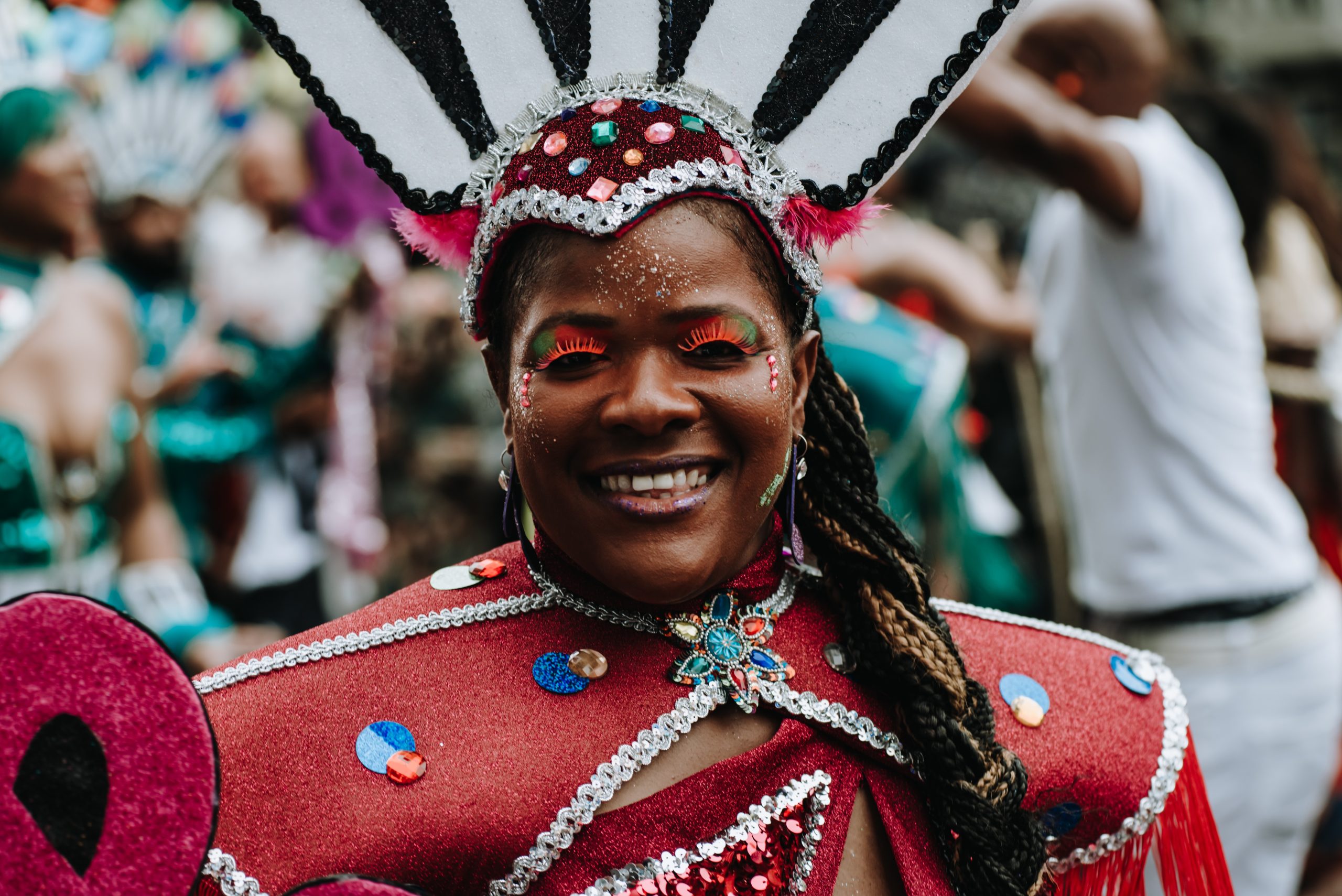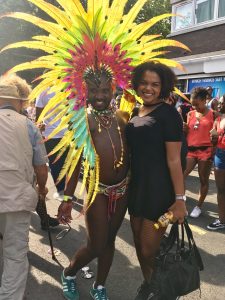
Recolonisation of African-descendent subjects in The Netherlands: a Rotterdam Carnival case study

In the past years, Rotterdam Carnival has become increasingly commercialised. What started as a version of carnivals organised on Caribbean islands like Aruba, with ample space for Black and queer creative expression, storytelling and protest, has over the years turned into a more mainstream event with a lot less of these characteristic elements. According to the latest party that organises the yearly celebration, Rotterdam Carnival is (still) “inspired by diversity” [1] and should be an accessible-to-all family function. I want to take a critical look at this trajectory over the past years and argue that in this situation, we’re witnessing ‘recolonisation’ of African-descendent subjects.
In 1980s Rotterdam, descendants of formerly enslaved folks from Aruba, Curaçao, Suriname, St. Martin and other countries in the Americas came together to host the first editions of Rotterdam Carnival. During these celebrations, Afro-Caribbean participants took to the streets to dance, enjoy historically contested music genres like Tambú [2], and protest against discrimination they experienced in The Netherlands [3]. Queer people were cultural visionaries for the parade, and the community did their best to make the space as free from restrictions of gender expression as possible – in line with the tradition on the islands [4]. As the years passed, many spectators were drawn to the festivity and what began as a protest celebration movement, became an opportunity for the city to profile itself as a shining example of superdiversity. Commercialisation potentially reached one of its peaks when Ducos Productions took the organisation over, blended the Carnival with Dunya Festival and baptised the new week-long celebration ‘Rotterdam Unlimited’ in 2013. [5]
Footage of 1984 Rotterdam Carnival
If we use Gloria Wekker’s framework of ‘white innocence’ [6], it becomes clear that the way in which Rotterdam Carnival (a Black / queer tradition) is increasingly and ‘innocently’ taken over by folks from outside of African cultures and queer subcultures as participants or organisers is not so innocent at all. As Rotterdam Carnival is increasingly culturally appropriated and presented as a party that should unite all of society, its radical roots become obscured and we are enticed to think it does not have anything to do with Africa or resistance against colonial oppression of African-descendent subjects [7]. In popular discourse, it might be seen as a neutral move to prohibit certain types of dancing that are deemed ‘vulgar’ and ‘inappropriate’ for large audiences, as happened in July of 2023 [8]. In fact, this is a colonial legacy in which African and African-descendant instruments, languages, music and ways of bodily and creative expression have been policed for centuries. An example: the Trinidadian steel pan – an instrument born out of creativity and resistance to constant instrument bans [9]. Instead of an increase in agency, freedom of expression and bodily autonomy, in this case, we’re rather encountering ‘recolonisation’ of formerly colonised subjects.
In Jab Forever, Grenadian artist Skinny Banton talks to us about the history of ‘Jab Jab’, a cultural carnival tradition of which the name is derived from the French Creole for devil (diable). Legends vary, but one version of history is that upon the legal emancipation of slavery, formerly enslaved Grenadians took the dark molasses syrup they were forced to produce for years and smeared it over themselves in defiance. This became a tradition on several islands – paraders take to the streets covered in black oil, mocking the former enslavers and the horrors of slavery by cracking whips and acting ‘devilish’. [10]
Such repression might create opportunities for a largely white police force to physically harass Black and queer folks participating in carnival. One parader I interviewed about the ‘vulgar dancing’ ban this summer happens to have been a victim of racist sexual violence in the past. “When I hear about a ban like this, all I can think is: one more reason for a white police officer to put his hands on me to control how I move my body through a public space.” When asked to share what carnival means to them, the folks I spoke to talked about feelings of agency and freedom. The specific dances, rhythms, costumes and all other elements seen in Caribbean carnivals have ties to pre-colonial and present-day African religions and celebrations, such as Calabar Carnival. For many participants, this is embodied knowledge – as becomes evident from the following comment by somebody I interviewed:
“I know I’m honouring my ancestors when I reclaim this street. I can feel that it is also African music I’m dancing to. Sometimes it makes me cry, because I can feel in my veins that I’m connected to those that I came from. We pour libations at the beginning of this parade – for a reason! I see people from across the diaspora unite in this festival over shared heritage: people from Nigeria can understand the Patois used in songs, as it closely relates to their Pidgin English. This is a space in which we get to feel alive, despite all the worries and racism we encounter in this city.”
Protest against the banning of these dances during carnival of this year underlines even more that carnival is not just a party, but a deeply spiritual engagement for those participating. The following performance of a children’s poem highlights how folklore on some Caribbean islands says that people even come back from the afterlife to participate in Carnival.
‘Carnival Jumbie’ or ‘Moko Jumbie’ symbolises a spiritual entity that can be traced back to West African spiritual traditions. [11]
In Decolonization and Afro-feminism, Sylvia Tamale reminds us of the importance of memory and a deep understanding of our histories [12]. The Netherlands – and other European countries home to local versions of Caribbean carnivals [13] – should indeed engage in memory work in order to contextualise traditions like Rotterdam’s Carnival and to stop excusing oppressive, colonial behaviour under the guise of ‘innocence’ and ‘trying to keep things accessible for children’. By looking back at what happened in the past and connecting that to the present and future, might we be able to imagine cultural manifestations that need not be co-opted and watered down by mainstream society to be valid? Not only the African continent, but its entire diaspora would benefit from such an approach.
[1] Ducos Productions (2023, June 30). Rotterdam Unlimited zomercarnaval. rotterdamunlimited.nl. https://www.rotterdamunlimited.com/
[2] De Jong, N. (2012). Tambú: Curaçao’s African-Caribbean ritual and the politics of memory. Indiana University Press.
[3] Guadeloupe, F., Van de Laar, P., & Van der Linden, L. (2020). Indische familiefoto’s, zomercarnaval en kapsalon: casestudies in postkoloniaal Rotterdam. In G. Oostindie (Ed.), Het koloniale verleden van Rotterdam (pp. 442 – 477). Boom Uitgevers.
[4] Drinkwaard, L. (2023, July 31). Vóór ‘bubbling’ verboden witte mensen al zwarte dans en muziek – OneWorld. OneWorld. https://www.oneworld.nl/identiteit/voor-bubbling-verboden-witte-mensen-al-zwarte-dans-en-muziek/
[5] Zomercarnaval Rotterdam. (n.d.). Immaterieel Erfgoed. https://www.immaterieelerfgoed.nl/nl/zomercarnavalrotterdam
[6] Wekker, G. (2016). White innocence: Paradoxes of colonialism and race. Duke University Press.
[7] Granger, C. (2020). Scènes van plezier, herinneringen aan onderwerping. In F. Guadeloupe, P. van de Laar & L. van der Linden (Ed.), Rotterdam, een postkoloniale stad in beweging (pp. 258 – 270). Boom Uitgevers.
[8] NOS. (2023, July 26). Strengere regels Zomercarnaval: niet te “vulgair” dansen en beperkte alcoholverkoop. NOS. https://nos.nl/artikel/2484365-strengere-regels-zomercarnaval-niet-te-vulgair-dansen-en-beperkte-alcoholverkoop
[9] The Origins of Steel Pan – Google Arts & Culture. (n.d.). Google Arts & Culture. https://artsandculture.google.com/story/the-origins-of-steel-pan-notting-hill-carnival/AAWBxQd4TKb21w?hl=en
[10] Noel, M. (2023, September 19). Exploring Grenada’s Jab Jab Tradition: A Symbol Of Black Expression And Liberation. Essence. https://www.essence.com/culture/roots-in-resistance-grenada-jab-jab/
[11] Bennett, S. A., Phillips, C., & Moore, N. (2009). Moko Jumbies: Dancing Spirits from Africa. Arts & Activities, 144(5), 24-25.
[12] Tamale, S. (2020). Decolonization and Afro-feminism. Journal of Contemporary African Studies.
[13] Know Your Caribbean [@knowyourcaribbean]. (2023, July 25). “Notting hill Carnival, the ‘second largest street festival in the world’ after Rio Carnival was birthed out of a response” [Video]. Instagram. https://www.instagram.com/p/CvHhKJjgUh2/?hl=en
Leave a comment
You must be logged in to post a comment.